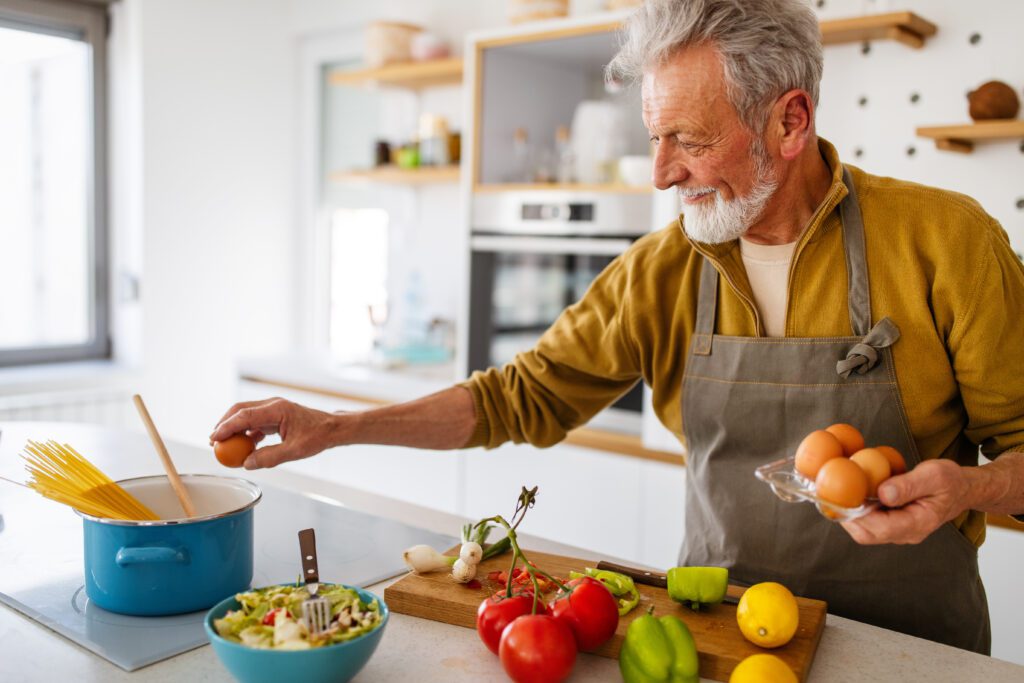
The reasons why nutrition changes as we age
Many people suddenly gain weight when aging, even though they have been slim all their lives. It is thus important to adapt your diet to your age.
Humans are creatures of habit – especially when it comes to nutrition. However, many people make the mistake of maintaining their diet for years without taking a look at their calorie or nutrient intake. People who eat the same food at the age of 50 or 60 as they did at 20 often struggle with obesity. Yet, there are a few tricks that can help you manage your diet as you get older.

Why should your diet be age-appropriate?
When it comes to nutrition, we often let ourselves be guided by our well-established habits. A delicious croissant in the morning, a large portion of spaghetti bolognese at lunchtime, and a hearty dinner: many people maintain their habits for years without keeping an eye on their body and its needs.
What we often don’t consider as we age is that our bodies need less energy. While you could still eat everything when you were 20, the excess calories tend to rapidly appear on the scales as you get older. Fitness experts like to talk about basal metabolic rate and power metabolic rate, which in principle can be applied to any age – regardless of whether you exercise or not.
The basal metabolic rate describes the energy intake needed to maintain vital processes (metabolism, respiration, digestion, and cardiovascular system). The basal metabolic rate can be calculated with a very simple formula: Body weight (kg) x 24 (hrs) x 1 kcal. Then there is the power metabolism. This describes the energy you need when you are physically active. Younger people often require 500 to 1,000 kcal more per day, while older people need considerably fewer calories (500 kcal max.).
Adapt your diet to your energy needs – the best tips
As a matter of fact, the older you get, the less energy you need, because you are no longer as active as you were when you were 20. While you could still regularly eat pizza and pasta without any problems when you were young, your body no longer tolerates such a diet when you get older.
Basal metabolic rate and power metabolic rate play a major role here, as energy consumption is significantly higher in younger years due to increased metabolism. In addition, young people usually exercise more often than older people. For this reason, you should adjust your diet to your energy needs from the age of 40. These tips can help you do this:

Cut down on your calories
As you age, your metabolism slows down. This means that your body doesn’t need as much energy, so you should reduce the amount of calories you eat. Simply reduce the quantity of your meals by eating less and less towards the evening.
Remember: Reducing calories does not mean not eating at all. Just leave out the “unhealthy foods” such as fast food, crisps, cakes and chocolate and replace them with fresh, unprocessed and local foods that are organically grown if possible. Cook for yourself rather than eating convenience foods to keep track of ingredients.
Eat fewer carbs
Carbohydrates are our body’s favourite energy source. They provide energy that the body finds increasingly difficult to metabolize as we age – with the result that the excess energy shows up in the form of fat on the belly and hips. For this reason, you should eat fewer carbohydrates. Cut down on pasta, rice, and bread and (if you do eat carbohydrates) go for whole grain products that are high in fiber.
Fiber is an indigestible component of food that increases the bulk of the food and helps you feel fuller for longer.
White flour products, sweets, fast food and convenience products, on the other hand, should be taboo or (if possible) consumed only occasionally. This also applies to juices and wine: they contain hidden sugar.
Drink a lot of water

Drinking is important at any age – especially in summer when outdoor temperatures rise. A minimum of 1.5 litres should be drunk throughout the day. It is best to always have a large water bottle with you, which you can for instance fill with still mineral water. This way you can always keep an eye on your water balance. Alternatively, you can drink unsweetened herbal tea.
Give priority to healthy fats
When you do reach for fat, you should favour healthy fats, such as those found in nuts, seeds (flax, pumpkin, sunflower), and oils such as flax, hemp and walnut. For example, flax and hemp seeds (and their oils) are rich in omega-3 fatty acids, which are said to help maintain cardiovascular health. You can also eat fish once or twice a week.
Our advice: Take a teaspoon of flax or psyllium seeds every day. They are supposed to get the digestion going. Don’t forget to drink, as the seeds are rich in fiber.
Eat more vegetables
Vegetables are not only low in calories – they are also particularly rich in vitamins, minerals and oligo-elements. The rule is: the more colourful the selection, the better!
Eat more protein
Protein is important – especially as we age, as muscle mass progressively decreases. Experts recommend eating 1 gram of protein per kilogram of body weight per day – preferably from plant sources such as legumes, nuts, seeds and tofu. Animal-based protein should be consumed in moderation, as it can promote inflammation.
Conclusion: Nutrition is important as we age
As we move less with age, it is essential to adjust the amount of calories we consume. The intake of micronutrients and protein plays an ever-increasing role in helping to keep the body healthy and maintain muscle mass. In contrast, the amount of carbohydrates should be reduced, as excess energy can show on the scales.
Your Humanoo Team